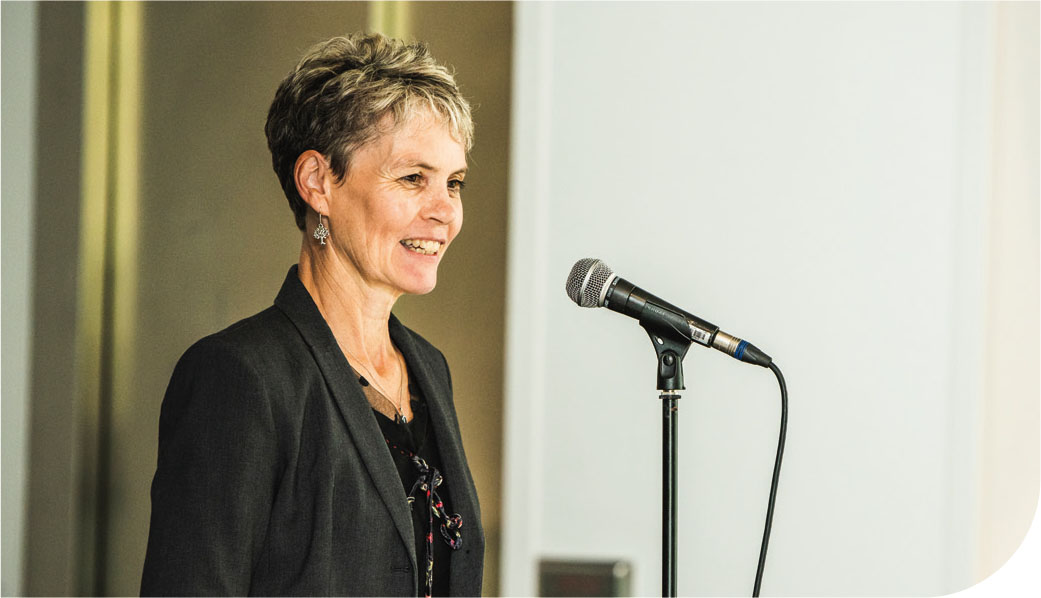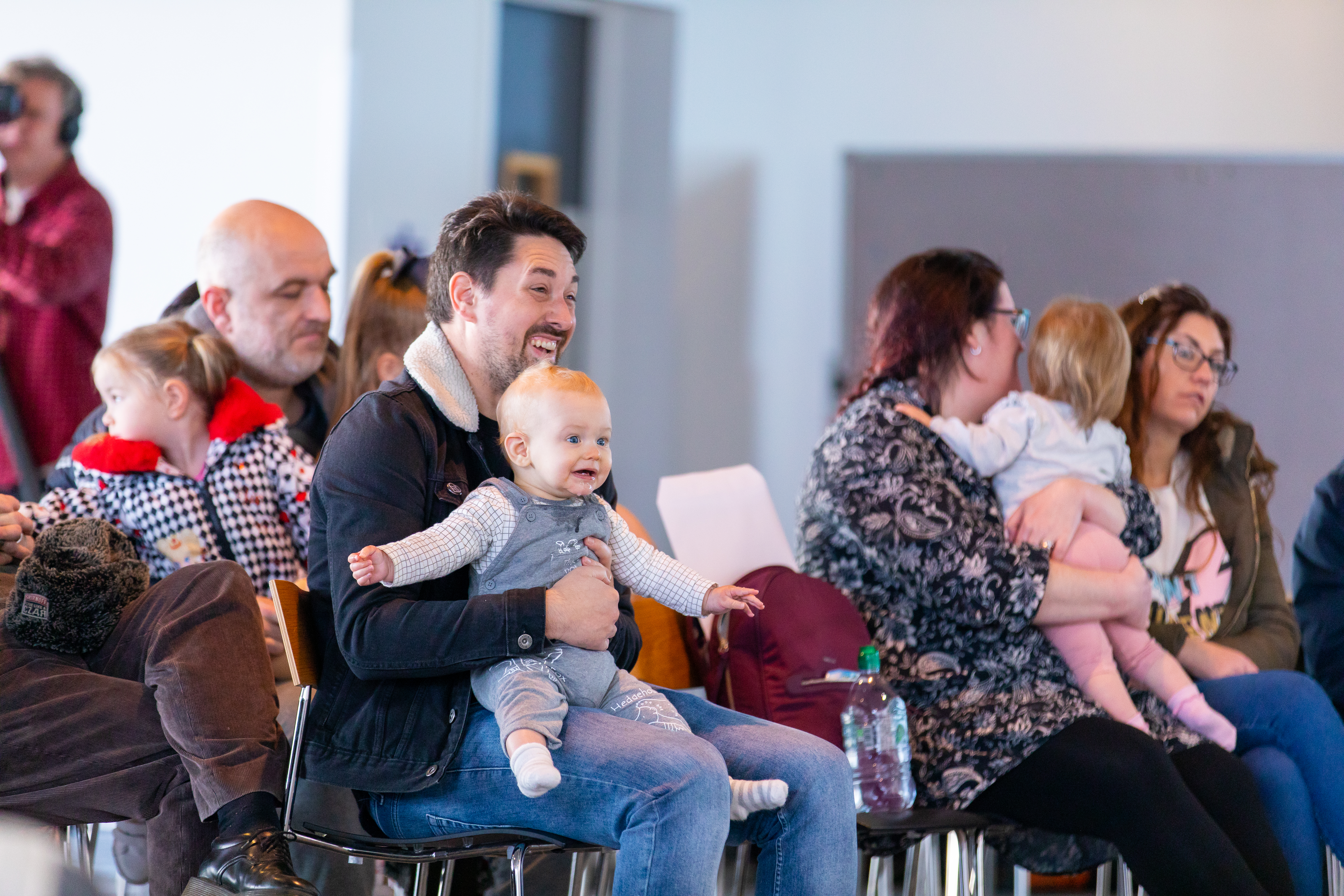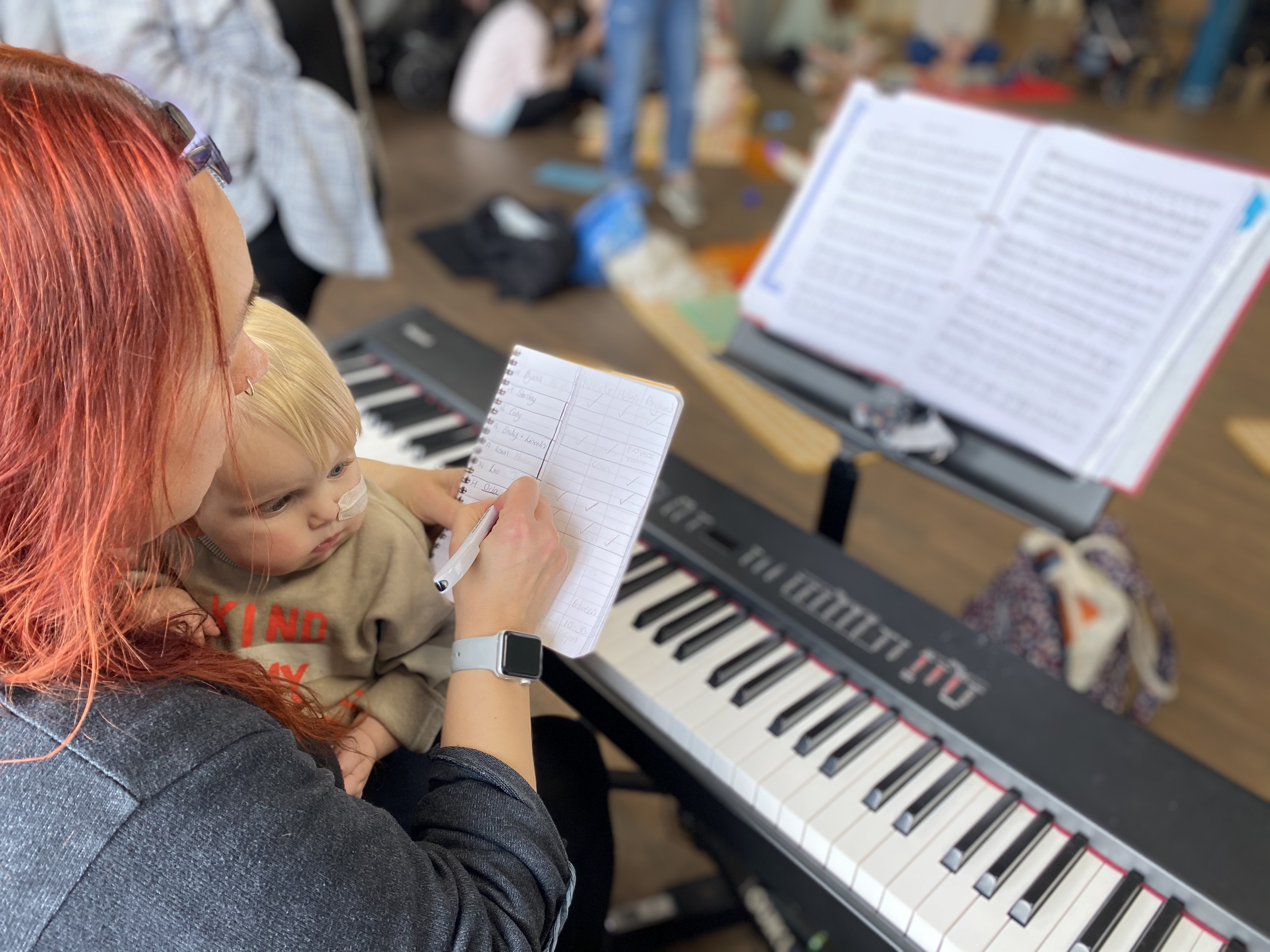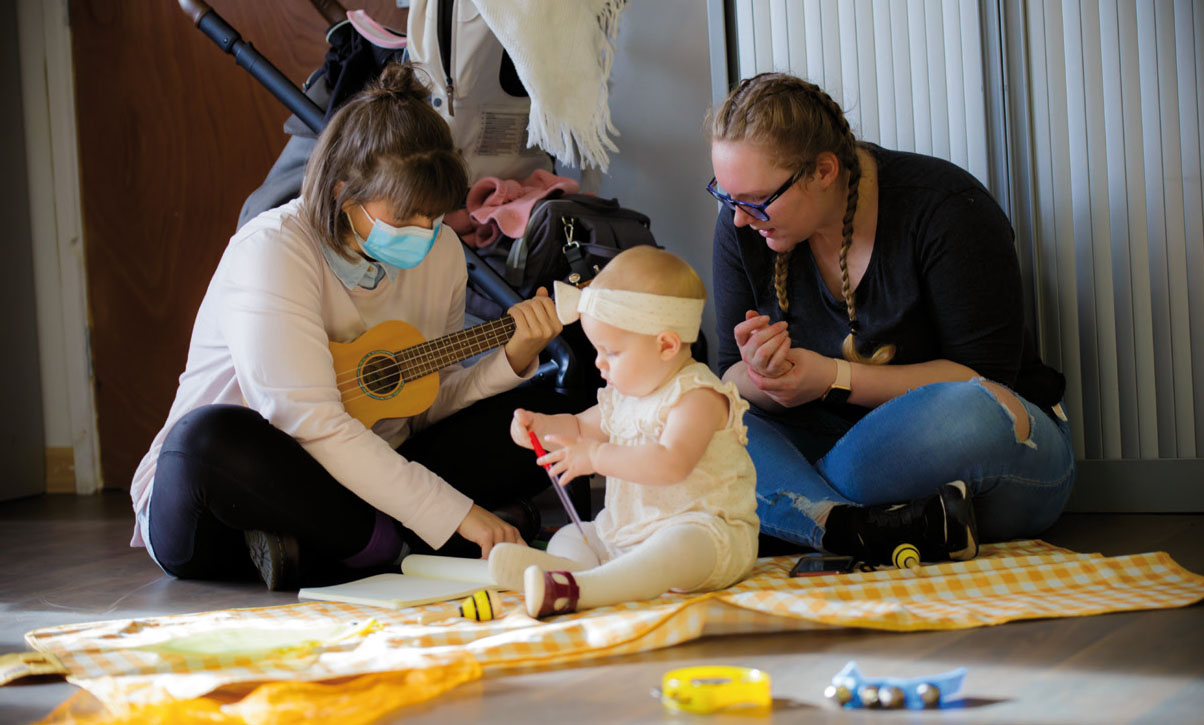
‘The lullaby is a very universal concept,’ says project lead Karen Irwin. The Lullaby Project, in basic terms, takes musicians and partners them with new mothers to help them write their own lullaby for their baby. ‘What Live Music Now brings to it is the expertise of our musicians in being able to facilitate song writing and help the women develop their ideas,’ explains Irwin.
It is thought that at least 13 per cent of new mothers in the UK are affected by postnatal depression (PND), with one study – conducted by University College London (UCL) during the pandemic – finding that an alarming 47.5 per cent of women with babies under six months met the threshold for PND during the first lockdown. Although often dismissed as the ‘baby blues’, persistent low mood, insomnia, fatigue, and feelings of guilt, hopelessness and anxiety that continue beyond two weeks of the baby being born can pose a serious threat to the wellbeing of both mother and child, as well as have significant social impacts.
Researchers at Royal College of Music (RCM) and UCL have been working in recent years to investigate the effectiveness of using musical interventions to reduce the occurrence and effects of PND symptoms. Led by RCM's Dr Rosie Perkins, the researchers worked with a group of women with moderate-severe symptoms, finding that by week six of a 10-week singing programme, new mothers had experienced a decrease of nearly 35 per cent in their symptoms, with 67 per cent of the women no longer displaying moderate-severe symptoms.
It is with this research in mind that the team at UK charity Live Music Now embarked upon the Lullaby Project in September 2021, inspired by and based upon a model established by New York's Carnegie Hall. Working with the NHS and other strategic partners, the project sees Live Music Now musicians paired with mothers who have been referred by the partner healthcare service they are accessing. As a charity focused on social impact, Live Music Now works with over 250 professional musicians across different projects who receive training to go into care, community and educational settings as facilitators. Irwin, Live Music Now's strategic director (children & young people) and director (North West) explains that in February 2021, 12 musicians took part in online training with Carnegie Hall teaching artists to introduce them to the project and equip them with the skills they'd need.


A participant's baby and partner watching the final concert at the Museum of Liverpool © MATT THOMAS
Since then, and still in its very early stages, Live Music Now's Lullaby Project has been piloted in three areas – the Cheshire and Merseyside Women's Health and Maternity Network, Flying Start in Cardiff, and the South West Yorkshire Partnership NHS Foundation Trust – and work is underway on an evaluation tool (based on the PERMA model – see p.40) which the team hopes will be key to rolling out the programme more widely. ‘We wanted to see how the Lullaby process can support maternal mental health and support the carer and child attachment and bonding. We're looking at how it can open up new social networks for women and caregivers, and at the impact on the child's development,’ says Irwin.
She adds that as an ‘extremely flexible’ programme, Lullaby could have a place in the NHS's early intervention and prevention agenda for women's mental health but could equally serve a different purpose in another setting, like an early years music programme. ‘[2021 was] very much a pilot year to see how the project model works and what it looks like in different settings – it has to be very bespoke to the women and caregivers we're working with, and we've learnt a lot already.’
How does it work?
The Cheshire and Merseyside pilot was an online project culminating in an in-person celebratory concert for family and friends. Having met their one-to-one musicians (introductory videos were sent to the mothers ahead of this to reduce anxiety), the women used a structured journal to write a letter to their babies. To develop the lyrics, the musician and the mother read this together and talked about the sentences and phrases that stood out.
Irwin suggests some questions that might have been asked: ‘Is there a rhythm? How does it sound when you speak it? And from that, is there a melody that emerges?’ She continues: ‘We trained the musicians to follow through this process, making sure that the mother's ideas were at the heart of the song and that it wasn't the musician writing the song for the mother.’ At the end of the project, the mothers had the opportunity to professionally record their lullabies, as well as take part in the concert, or watch from the audience. Reading through the project feedback as we speak, Irwin says, ‘It's amazing how many of the participants said at the start that they were nervous and didn't think they'd be able to write the song. They'd never done it before, but our musicians have got the skills in facilitation.’
While maternal wellbeing is at the heart of Lullaby, the musical experiences and skills of both mother and baby are also part of the long-term plan, says Irwin: ‘We hope that Lullaby is just the start of a relationship with families and that we will be able to develop more opportunities for them to take part in music making. We also want to develop more resources that families can use as children develop.’ She adds: ‘It's just the start of our Lullaby journey, and there's huge potential for this one simple activity to open up more musical activities for families to enjoy together.’


Participants of the Lullaby Project with Flying Start Cardiff © COURTESY LIVE MUSIC NOW
Musical journey
For Georgina Aasgaard's ‘mum’ Victoria, the Lullaby Project has already sparked longer term musical engagement, despite her insisting at the start of the process that she couldn't sing. Aasgaard, who was the lead musician on the project in the northwest, tells me: ‘Victoria sent me a text message saying that she'd just sent Molly to sleep with our song, and that she'd decided to join a choir after Christmas.’ The cellist worked with Victoria remotely over five weeks, including one in-person session at the family's house (‘Molly was a bit shell-shocked to see a stranger walking in with a big red cello case on her back!’), which Aasgaard describes now as ‘amazing’.
‘I just had the most incredible journey with Victoria,’ she continues. ‘Her child was 15 months and she decided to use the sessions as a bit of “me time”, which was interesting. She said she wanted to create something that would last forever and was calm and peaceful. She mentioned that her favourite lullaby is My bonnie lies over the ocean, which I played for her on the cello. When I stopped, Victoria felt really emotional because I think the sound of the cello made her feel something inside that she had never felt before.’ Victoria also mentioned that one of her favourite pieces of classical music is Pachelbel's Canon, so Aasgaard incorporated part of that into the lullaby's melody too.
The in-person session was the first time the family had experienced the sight and sound of a cello, making this a formative moment for 15-month-old Molly. ‘She was mesmerised and intrigued by the instrument,’ recalls Aasgaard. ‘I started playing the bass line, Victoria was humming, and Molly was joining in with little instruments I had brought. It was interesting because as soon as we started playing together, Molly instantly recognised the song.’
Victoria's musical development was marked too, Aasgaard tells me, herself evidently deeply passionate about this project. Victoria signed up for the optional recording session at the end of the process, saying that she would ‘just come along and sing the chorus’. In the end, she sung the full lullaby (entitled Sweet Baby Molly), which her child now has as a permanent keepsake. ‘It was so meaningful,’ says Aasgaard, ‘because I witnessed Victoria gain so much confidence in singing, projecting her voice, and using it as a creative and expressive outlet.’
Although the lullaby they wrote together is simple, according to Aasgaard, she says: ‘For me, the outcome was really the fact that Victoria sang the whole song, recorded it, and presented it to her family – all these things are huge.’ The fact that every lullaby written is completely different – some are very elaborate, incorporating cello, vocals, flute, double bass and guitar, while others are much simpler – highlights that Lullaby is what Aasgaard calls ‘a listening project’. She continues: ‘It was about tuning into our participants and promoting a creative process that's equally shared between the musicians and the participants. Also, very importantly, it was in a non-hierarchical and non-judgemental environment – it was not me as a musician coming to show her what we could do; I was just there trying to identify Victoria's needs.’ Aasgaard reflects for a moment, then says: ‘In a way, every session had a sense of adventure for both parties as we were tuning into each other.’
Rollout to every mother
The final concert took place at the Museum of Liverpool on 27 November 2021 – the eight new lullabies were performed by the four musicians, and three of the mothers went up on stage to sing too. ‘I think that's what struck me most about the project –,’ says Irwin, ‘that through the process of writing a lullaby, the mums were so proud to share it with their partners and wider family. It was a really lovely social occasion – music brings people together, and we're seeing that really strongly through the project so far.’
Something that both Irwin and Aasgaard said during our separate conversations has stuck with me since. They both asked, in words to this effect: ‘Wouldn't it just be amazing if every new mother was given the opportunity to write a song for their child?’ Irwin talks excitedly about Live Music Now's ambitions to rollout Lullaby much more widely, but also stresses that the charity is not the only one to be running the programme in the UK: ‘The Irene Taylor Trust has been doing some wonderful Lullaby work with fathers in prisons recently, so we've been chatting to them to see if we can share some learning.’
To further expand the project, Live Music Now is currently looking for new NHS partners in perinatal mental health, as well as community groups or networks that already exist to support new mothers and babies. Irwin says: ‘I guess it all comes down to resources, but we see it as a really good investment because if you're able to support a mum with perinatal mental health issues through early intervention, then potentially that can provide more confidence and agency and improve mental health.’ As part of the evaluation process, the team is calculating the social return on investment so that they can show stakeholders exactly how much money could be saved in NHS services by investing in a Lullaby programme.
I'm left with an overwhelming sense of excitement and energy, perhaps helped by the fact that both Irwin and Aasgaard inform me that I'm the first person they've properly spoken to about Lullaby. ‘These initial pilot programmes have confirmed that there's great potential,’ says Irwin. ‘We can see the immediate impact that Lullaby has on women and babies and there's huge potential to roll it out further, so I feel really excited about it. I'm also excited for Live Music Now because it fits perfectly with our mission as a social impact charity, and with the skills of our professional musicians who are performers and musical facilitators.’
‘I think there should be a Lullaby movement,’ concludes Irwin triumphantly. Whether a full-blown awakening or a gentle stir, this will take us one baby step closer to ensuring that music forms the building blocks of every child's life.

Participants of the Lullaby Project with Flying Start Cardiff © COURTESY LIVE MUSIC NOW
www.livemusicnow.org.uk/lullaby-project
The lullabies from the Cheshire and Merseyside Lullaby Project can be heard on Soundcloud at: bit.ly/3q4RXp4








